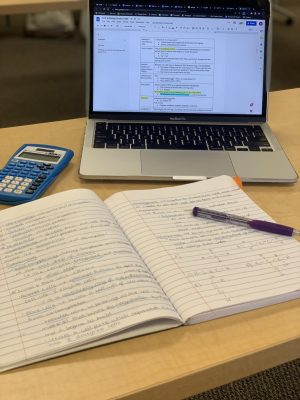We’ve all heard about it or experienced it: stress. That feeling when you have too much to do and not enough time or energy to get it all done. It isn’t uncommon, in fact, it is actually a good thing for our brain to experience stress, according to Middle school (MS) psychologist Kelly Decker. Stress is the body’s way of getting the brain’s attention and is supposed to motivate the mind to get stuff done, whether it be studying for a math test, running the last leg of a track event or meeting a deadline for an essay. Decker explained the difference between stress and anxiety, both of which Harvard-Westlake (HW) students experience.
“Stress is a good thing, it’s very adaptive and gets our attention. So, when stress overwhelms us, and we can’t cope with it, then the result is sometimes usually anxiety,” Decker said. “Yes, [anxiety can be enhanced by the HW’s school environment], it will impact how you experience the anxiety, the severity, and exacerbate the anxiety for sure.”
In a Spectrum survey sent out exclusively to HW MS, students answered questions about when they felt stressed out and what makes them stressed. Approximately 30 percent of students responded to the survey, and 50 percent of students said that on a scale of one to ten, ten being unbearably stressed out, they felt around a seven or above, on average.
“[What stresses me out the most is] not so much homework, but more just the long term dread of having a test or quiz always coming up, and the only exception is during [winter or spring] break,” a survey respondent said.
In March of 2018, a “Challenge Success” survey was sent out to all grades at HW asking students about their stress and sleep levels, parental expectations and cheating occurrences. The series of questions was sent out by the HW Task Force, in order to gain a better sense of the welfare of the students.
Students who are accepted to HW often face questions such as “do you really have three hours of homework a day?” and “Do you ever have time to relax?” Innocent curiosity may fuel some of these questions, but HW’s reputation of ruthless academic rigor cannot be overlooked. Teachers and administrators are quite aware of and are not fazed by the idea that HW is known to have a stressful environment.
“There’s pressure from the parents and there is also pressure from the kids. The students pressure each other [to do better],” ninth grade dean and history teacher Matthew Cutler explained.
Among the “Challenge Success” survey results, the leading stressor amongst all grades was workload, followed by assessments. There is also an inverse correlation between the average number of hours of homework on weeknights to the average number of hours of sleep students get in each grade.
The results show that as students go into older grades, the time it takes to complete homework increases, averaging as high as 3.6 hours per night. The sleep patterns averaged as low as 6.2 hours per night, close to 3 hours less than they should be getting; according to the Academy of Pediatrics, children under 18 years old are recommended to get 9 hours of sleep per night.
“These sleep numbers really do concern me. It’s concerning, I mean, I didn’t think they were this low,” Decker said. “Yes, [I would declare the MS sleep averages as unhealthy], we get an F in sleep.”
The school has made many attempts to change its strenuous academics, such as limiting the amount of AP classes that can be taken and getting rid of the grade boost from honors classes; however 20 percent of the entire MS still experiences stress daily, according to the MS survey.
To Decker, this fact is odd, since younger grades at HW are generally believed to have a reduced workload. Decker believes that there are more instances of deeper rooted issues due to stress at the US than at the MS. According to Decker, the environment at the MS is very different (or is supposed to be) from that of the US because school normally becomes progressively more difficult as applying to college comes nearer.
“I’ve heard it feels more competitive [at the US], because people are competing to get into the same 20 best colleges and that increases the pressure,” Decker said.
The “Challenge Success” survey supports Decker, listing “college/future” as the third highest stressor for students at the Upper School (US). However, many students at the MS believe that since colleges look at your grades starting in ninth grade, there is more pressure to do better and take classes with a higher curriculum.
“I think there’s definitely a standard that people feel pressured to meet when it comes to taking AP’s and having a bunch of extracurriculars,” Addison Gamradt ’23 said. “For me personally there isn’t anyone putting pressure on me [to take higher curriculum classes and extracurriculars] besides myself, but there is definitely pressure for other people because ninth grade is the beginning of getting into a good college.”
Across both campuses, academic pressure is the leading cause of stress. At the MS, 60 percent of Challenge Success Survey respondents said that school work makes them the most stressed as opposed to extracurriculars. Thirty percent said that their stress is induced by both academics and out of school commitments.
“Sometimes it’s really hard to balance academics along with athletics. I live far away so it’s kind of hard to get everything done,” a student who wished to remain anonymous said.
Over the past few years, the school has gained a reputation for cultivating an extremely competitive environment, and the pressure of doing well has not only consumed the minds of students, but also the minds of parents.
“What tends to happen is, because students are grade-focused, and because parents are often grade-focused, it tends to heighten anxiety,” Cutler said.
Many parents and students alike idealize that students should never have to look for validation or have to meet expectations, yet according to the Challenge Success Survey, less than 15 percent of students at the MS campus believe they always meet their parents’ expectations. Some students feel like they often meet their parents’ expectations, the survey placing this group at around 50 percent.
“In ninth grade, in the eyes of many kids and many families, college is just around the corner. For me, it’s on a very distant horizon, but I know that the idea of colleges looking at how students do in 9th grade is stressful to students and parents,” Cutler said.
Private schools such as HW receive extremely high expectations from the outside world for their students to succeed. To many, this success is defined as going to a good school and having a good career, which is evident whening look at the amount of successful HW alumni the school has introduced to students. Having panels with past students like award winning actress Lily Collins ’07 may inspire some, it also sets an example of fame to which outsiders expect HW students to amount.
“Where is the pressure coming from? Oh, I think it’s embedded in the reputation of the school,” Decker said.
Taking a look at other private schools in the Los Angeles area, it is clear that HW isn’t the only school that feels pressured for its students to succeed. Last year, independent investigators looked into what the Buckley School’s board of trustees called “an isolated incident of grade changes,” according to a segment on NBC L.A. News on Feb. 7, 2018.
These changes were made to students grades who were applying to college, and may have resulted in former Buckley head of school James Busby resigning in addition to affecting Buckley stu
dents’ admission into college, according to the report.
What happened at the Buckley school is just one scenario where faculty felt pressured for their students to thrive. When looking at the MS, the average percent of seventh graders who admitted to having cheated on a small assignment was 53 percent. For eighth grade it was 75 percent, and in ninth, 59 percent said they’d done something that quantifies as cheating at some point in the last year.
At HW, when facing stress from the environment, school work, and other students, cheating on small assignments can be a coping mechanism. Students also feel pressured by expectations set by the school and even their own parents, not only affecting their mental health, but their physical health. The stress levels and standards that make HW what it is may be partly motivational, but at a price.










